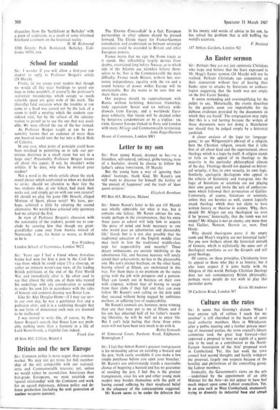An Easter sermon
Sir: Perhaps they are not just optimistic Christians who hope and believe that the fears expressed in Mr Hogg's Easter sermon (24 March) will not be realised. Perhaps Christians can concentrate on their ecumenism without fear of leaving their flanks open to attacks by historians or archaeo- logists suggesting that the tomb was not empty on the first Easter Sunday.
It seems misleading and oversimplifying for the pulpit to say, 'Historically, the events described by the gospels seem too improbable for the dubious evidences provided by the documents on which they are based.' The congregation may reply that this is a red herring because the writers of those documents were not doing a Manchester nor should they be judged simply by a historical yardstick.
A closer analysis of the logic (or 'language- game,' to use Wittgenstein's phrase) of a religion, here the Christian religion, reveals that it talks first of all about God and the supernatural, about theology which is a logic by itself. A religion stands or falls on the appeal of its theology to the majority in the particular philosophical climate of the day. Theology should not depend on histori- cal veracity; it has its own veracity, its own logic. Similarly, apologetic theologians who appeal to the criteria of historicity and transgress into the logic of historians or scientists are not playing their own game and invite the sort of embarrass- ment which followed their persecution of Galileo. Conversely, of course, historians or scientists, unless they are heretics as well, cannot logically attack theology which does not claim to have written history or theorise in science. Why, then, should Mr Allegro cut any theological ice even if he 'proves,' historically, that the tomb was not empty? Mr Allegro is not an enemy, any more than was Galileo, Newton, Darwin or, now, Fred Hoyle.
Why should theologians panic if the empty tomb and Mary's virginity are not historical facts? No one now bothers about the historical untruth of Genesis, which is stylistically the same sort of theological manifesto as are the Gospels and still good theology.
Of course, on these principles, Christianity loses its appeal to those who like it as history; but it also loses respect if it joins battle with the Allegros of this world. Perhaps Christian theology does not suit contemporary British philosophy; perhaps more people do not wish to play that particular game. Kevin McAndrews 59 Carleton Road, London N7






























 Previous page
Previous page